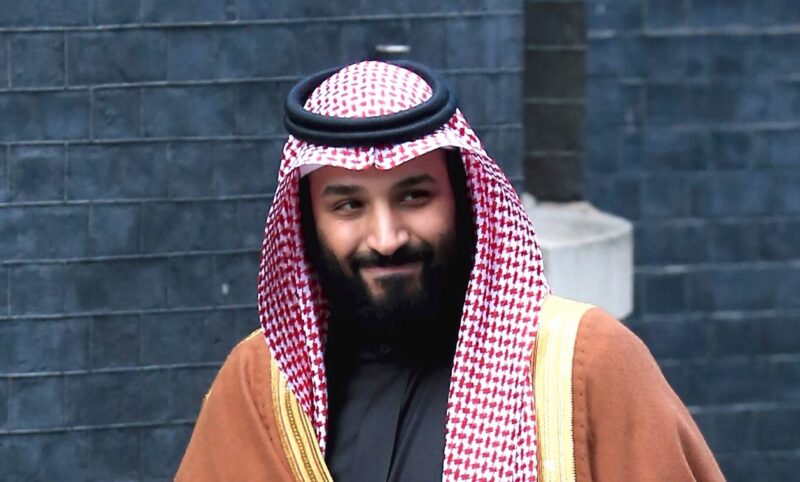Golf
Is Saudi Arabia buying sports? It’s not just about business, it’s also about influence. Golf has shown the way
If you only vaguely follow world sports, you’ve probably heard about Saudi Arabia in recent years or months. Its athletes may not be on the podium, its fan base is not as devoted, but the desire to build something great is greater there than anywhere else.

If you only vaguely follow world sports, you’ve probably heard about Saudi Arabia in recent years or months. Its athletes may not be on the podium, its fan base is not as dedicated, but the desire to build something great is greater there than anywhere else. Add to that an endless source of funding and we can suspect that wild times are ahead.
The old saying goes that might makes right. It has always been so, at least in nature, and it has always been so on the sporting field. But times are changing. Especially in sport today, money plays a far greater role than performance on the field. We may not like it, but that’s just the way it is. The richest man wins.
And it is in the professional sports world that this rule is being set in motion more and more quickly. Americans and Europeans have been building their sports business for years. They’ve built world-class football, hockey, basketball, baseball, and other competitions where billions are being made.
Yet an even more financially powerful player is beginning to emerge – Saudi Arabia. The Public Investment Fund (or PIF) has decided to cast its net around the world and invest unimaginably large sums of money, mainly from oil production, in a new era for the country.
Vision 2030 & NEOM
Saudi Arabia’s Crown Prince Muhammad bin Salman wants to make this country something unparalleled even in the modern world today. One of his biggest projects is the so-called Vision 2030.
This project is intended to make Saudi Arabia one of the most powerful players in the world. It is a strategic framework for reducing Saudi Arabia’s dependence on oil, diversifying its economy and developing public service sectors such as health, education, infrastructure, recreation and tourism.
The project includes a futuristic city called NEOM, which will feature a 170-kilometre-long building called The LINE, which itself will be one big linear city. It will connect the Red Sea coastline with the mountains and valleys in the northeast of Saudi Arabia.
The LINE is expected to be home to up to one million residents. In addition, the city will be completely powered by renewable energy sources. No factories, no cars, no emissions. That’s just to give you a rough idea of how tiny a chunk of that huge package Saudi Arabia wants to invest in sports.
Sport as part of the plan
“The other thing that is very important to bin Salman is that Saudi Arabia becomes a tourist destination and sport is a big magnet for foreign travellers. He has a plan to make Saudi Arabia a place unlike any other in the world, and he has the resources to go into big events that Dubai, for example, could never compete with,” Bradley Hope, journalist and author of the bestselling 2020 book Blood and Oil, told The Athletic.
“It’snot going to happen overnight, but Saudi Arabia offers a lot more than people realize: a much larger landmass, diversity of terrain, authentic historical sites, a long Red Sea coastline and other things. Sport is a big part of making Saudi Arabia a place that people want to visit,” Hope added.
He also says bin Salman’s “political base” is the young people of Saudi Arabia. He is interested in making the country a better place for them to live, including better jobs, education and entertainment.
While sport itself is not entirely central to the overall plan, it is one of the many essential pieces of the jigsaw in which the PIF has chosen to invest very generously. However, not everyone is of the opinion that this strategy is well-intentioned.
“ThePIF’s investments in sports that are not watched or played in Saudi Arabia (such as cycling, golf or tennis) are another example of why these investments are mainly used to change the kingdom’s image and buy influence, not to improve domestic public health or diversify the economy.It’s not about sport, it’s about influence,” says Dr. Khalid Aljabri, a Saudi cardiologist and businessman currently based in Washington.
There is a very broad spectrum of public opinion that Saudi Arabia is trying to obscure the miserable human rights conditions in the country with these investments. Moreover, Khalid Aljabri is convinced that the PIF’s gigantic investment can never be recouped from a business perspective.
Golf has shown the way and the threat at the same time
Golf is an ideal example. For years, the Saudis have been trying to break into the professional golf ecosystem until they created a competition called LIV Golf. A project that only the Saudis and a few other adventurers believed in at its inception.
It wasn’t easy to attract the world’s big names. This was helped, of course, by very generous signing bonuses. For many players, these were larger sums than they could earn in their future careers.
PIF Governor Yasir Al Rumayyan loves golf. Perhaps that’s why the sport globally became one of the first the Saudis tried to break into. Of course, in the past, they have peeked into football, tennis and Formula 1.
But this is a little different. Something more global, because it’s not about one team or club. It’s a competition that doesn’t just travel around the American continent, but around the world, like the PGA Tour.
A successful process
Yasir Al Rumayyan hired former world number one Greg Norman as CEO and together they began to change the golf world. The PGA Tour resisted for approximately two years, labeling LIV Golf as nothing more than an artificial tool to cover up Saudi Arabia’s human rights suppression problems. In the beginning, the PGA considered the LIV an unviable project in the long run.
Only, the PGA Tour more than once started to have financial problems in addition to some really good players. Another costly item was litigation, which further squeezed the increasingly empty coffers. For a long time, PGA Commissioner Jay Monahan wanted nothing to do with these people. But then he and Al Rumayan unexpectedly got together and baked a deal behind the backs of the players and the public.
Was it necessary? In terms of how the PGA Tour will operate in the future, probably yes. Especially after Monahan boldly threw any hints of negotiations in the trash at the beginning. He believed the PGA Tour was a strong and capable enough enterprise to support itself. In the end, he probably found out he miscalculated.
The PGA Tour didn’t practically have to go hand in hand with LIV Golf and the PIF, as it probably will now. It was just a matter of agreeing terms so that the two entities could operate independently in the golf world and players could simply play where they wanted. Only Monahan subsequently suspended golfers who decided to give LIV Golf a taste.
He wanted to discourage other players who decided to try something else. Since LIV Golf is a lucrative proposition for golf professionals, it was probably only a matter of time before more would flee the PGA.
Will Saudi Arabia buy the world’s sport?
So what can be gleaned from this? Probably that Saudi Arabia has such strong financial capital that with a little patience it will be able to financially drain even a previously completely independent enterprise. The world is not big enough for two large organisations to operate so completely separate.
It would not be beneficial to golf or the fans. In this case, the phrase now going around the world is that “Saudi Arabia has bought golf”. Officially, it may look different, as Jay Monahan remains the head of the entire joint entity on paper, but clearer heads know that whoever funds ultimately dictates.
Any talk of morality has been trumped by finance. Monahan became a traitor and the Saudis got what they wanted from the start thanks to LIV Golf. To be accepted by the public. It will probably be good for golf itself, fans will once again see the best players in the world on the course together.
But for the rest of the sporting world, it’s a very emphatically raised finger. In a way, LIV Golf has shown the way for Saudi Arabia to gain further sporting exposure in the future.
The Saudis have made no secret of the fact that they want to host, for example, a football championship in the near future. Moreover, the last World Cup in Qatar showed that the moral side of the host country is not entirely essential. The Qatar championship was heavily criticised, but in terms of viewing figures, it broke records once again.
Business was good and that is the main thing. And that is what will set the tone in the years to come.
Source: The Athletic












